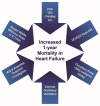Prognostic Role of Metabolic Exercise Testing in Heart Failure
- PMID: 37445473
- PMCID: PMC10342748
- DOI: 10.3390/jcm12134438
Prognostic Role of Metabolic Exercise Testing in Heart Failure
Abstract
Heart failure is a clinical syndrome with significant heterogeneity in presentation and severity. Serial risk-stratification and prognostication can guide management decisions, particularly in advanced heart failure, when progression toward advanced therapies or end-of-life care is warranted. Each currently utilized prognostic marker carries its own set of challenges in acquisition, reproducibility, accuracy, and significance. Left ventricular ejection fraction is foundational for heart failure syndrome classification after clinical diagnosis and remains the primary parameter for inclusion in most clinical trials; however, it does not consistently correlate with symptoms and functional capacity, which are also independently prognostic in this patient population. Utilizing the left ventricular ejection fraction as the sole basis of prognostication provides an incomplete characterization of this condition and is prone to misguide medical decision-making when used in isolation. In this review article, we survey and exposit the important role of metabolic exercise testing across the heart failure spectrum, as a complementary diagnostic and prognostic modality. Metabolic exercise testing, also known as cardiopulmonary exercise testing, provides a comprehensive evaluation of the multisystem (i.e., neurological, respiratory, circulatory, and musculoskeletal) response to exercise performance. These differential responses can help identify the predominant contributors to exercise intolerance and exercise symptoms. Additionally, the aerobic exercise capacity (i.e., oxygen consumption during exercise) is directly correlated with overall life expectancy and prognosis in many disease states. Specifically in heart failure patients, metabolic exercise testing provides an accurate, objective, and reproducible assessment of the overall circulatory sufficiency and circulatory reserve during physical stress, being able to isolate the concurrent chronotropic and stroke volume responses for a reliable depiction of the circulatory flow rate in real time.
Keywords: cardiopulmonary exercise testing; diagnosis; functional capacity; heart failure; metabolic exercise testing; oxygen consumption; prognosis.
Conflict of interest statement
W. H. Wilson Tang is a consultant for Sequana Medical, Cardiol Therapeutics, Genomics plc, Zehna Therapeutics, Renovacor, WhiteSwell, Kiniksa, Boston Scientific, CardiaTec Biosciences, and Intellia, and has received honorarium from Springer Nature and American Board of Internal Medicine.
Figures


Similar articles
-
What about chronotropic incompetence in heart failure with mildly reduced ejection fraction? Clinical and prognostic implications from the Metabolic Exercise combined with Cardiac and Kidney Indexes score dataset.Eur J Prev Cardiol. 2024 Jan 25;31(2):263-271. doi: 10.1093/eurjpc/zwad338. Eur J Prev Cardiol. 2024. PMID: 37890033
-
Preserved right ventricular ejection fraction predicts exercise capacity and survival in advanced heart failure.J Am Coll Cardiol. 1995 Apr;25(5):1143-53. doi: 10.1016/0735-1097(94)00511-n. J Am Coll Cardiol. 1995. PMID: 7897128
-
Impact of Atrial Fibrillation on Exercise Capacity and Mortality in Heart Failure With Preserved Ejection Fraction: Insights From Cardiopulmonary Stress Testing.J Am Heart Assoc. 2017 Oct 31;6(11):e006662. doi: 10.1161/JAHA.117.006662. J Am Heart Assoc. 2017. PMID: 29089343 Free PMC article.
-
Developments in Exercise Capacity Assessment in Heart Failure Clinical Trials and the Rationale for the Design of METEORIC-HF.Circ Heart Fail. 2022 May;15(5):e008970. doi: 10.1161/CIRCHEARTFAILURE.121.008970. Epub 2022 Mar 3. Circ Heart Fail. 2022. PMID: 35236099 Review.
-
Cardiopulmonary Exercise Testing in Adult Congenital Heart Disease.Ann Am Thorac Soc. 2017 Jul;14(Supplement_1):S93-S101. doi: 10.1513/AnnalsATS.201611-876FR. Ann Am Thorac Soc. 2017. PMID: 28375677 Review.
Cited by
-
Age Differences in Cardiopulmonary Exercise Testing Parameters in Heart Failure with Reduced Ejection Fraction.Medicina (Kaunas). 2023 Sep 20;59(9):1685. doi: 10.3390/medicina59091685. Medicina (Kaunas). 2023. PMID: 37763804 Free PMC article.
-
Transition to Advanced Heart Failure: From Identification to Improving Prognosis.J Cardiovasc Dev Dis. 2025 Mar 17;12(3):104. doi: 10.3390/jcdd12030104. J Cardiovasc Dev Dis. 2025. PMID: 40137102 Free PMC article. Review.
References
-
- Tsao C.W., Aday A.W., Almarzooq Z.I., Anderson C.A.M., Arora P., Avery C.L., Baker-Smith C.M., Beaton A.Z., Boehme A.K., Buxton A.E., et al. Heart Disease and Stroke Statistics-2023 Update: A Report from the American Heart Association. Circulation. 2023;147:e93–e621. - PubMed
-
- Benjamin E.J., Muntner P., Alonso A., Bittencourt M.S., Callaway C.W., Carson A.P., Chamberlain A.M., Chang A.R., Cheng S., Das S.R., et al. Heart Disease and Stroke Statistics-2019 Update: A Report From the American Heart Association. Circulation. 2019;139:e56–e528. doi: 10.1161/CIR.0000000000000659. - DOI - PubMed
-
- Heidenreich P.A., Albert N.M., Allen L.A., Bluemke D.A., Butler J., Fonarow G.C., Ikonomidis J.S., Khavjou O., Konstam M.A., Maddox T.M., et al. Forecasting the impact of heart failure in the United States: A policy statement from the American Heart Association. Circ. Heart Fail. 2013;6:606–619. doi: 10.1161/HHF.0b013e318291329a. - DOI - PMC - PubMed
-
- Virani S.S., Alonso A., Aparicio H.J., Benjamin E.J., Bittencourt M.S., Callaway C.W., Carson A.P., Chamberlain A.M., Cheng S., Delling F.N., et al. Heart Disease and Stroke Statistics-2021 Update: A Report From the American Heart Association. Circulation. 2021;143:e254–e743. - PubMed
-
- Bozkurt B., Coats A.J., Tsutsui H., Abdelhamid M., Adamopoulos S., Albert N., Anker S.D., Atherton J., Bohm M., Butler J., et al. Universal Definition and Classification of Heart Failure: A Report of the Heart Failure Society of America, Heart Failure Association of the European Society of Cardiology, Japanese Heart Failure Society and Writing Committee of the Universal Definition of Heart Failure. J. Card. Fail. 2021;27:387–413. - PubMed
Publication types
LinkOut - more resources
Full Text Sources

